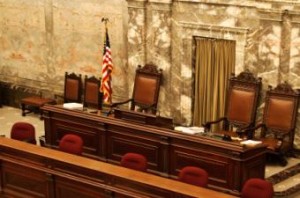 Fifteen Senate and House lawmakers called on Federal Reserve Chair Janet Yellen on Monday to strengthen a proposed rule checking the central bank's ability to lend vast sums of money to large banks in a crisis.
Fifteen Senate and House lawmakers called on Federal Reserve Chair Janet Yellen on Monday to strengthen a proposed rule checking the central bank's ability to lend vast sums of money to large banks in a crisis.
In a rare show of bipartisanship, Sens. Elizabeth Warren (D-Massachusetts) and David Vitter (R-Louisiana) joined four other senators and nine House members in a letter that warned against a weak proposed rule that signers said would fail to place "meaningful restrictions" on its ability to bail out financial institutions.
"If the Board's emergency lending authority is left unchecked, it can once again be used to provide massive bailouts to large financial institutions without any congressional action," lawmakers wrote.
If the Fed finalizes it, the current proposed rule would implement language under the Dodd-Frank Act designed to increase the number of banks eligible for emergency capital in a crisis and prevent the kind of widely criticized infusions to a few institutions that took place in the Great Recession.
Critics—like the group lawmakers—believe it doesn't go far enough.
The letter cited a lack of penalties and time limit, with Warren, Vitter, and other signers calling for penalty rates, more procedures, and broader definitions to accommodate more than just large financial institutions.
Another complaint is that the rule would allow Fed governors to sidestep elected officials. Under the current rule, the Fed would only need a vote from five board members in order to authorize bank loans.
"The Board's proposed rule fails to strike the appropriate balance between promoting financial stability and mitigating moral hazard among the largest financial institutions," signers added.
Criticism persists after the 2008 financial crisis, which saw the Fed, under then-Chairman Ben Bernanke, dole out trillions of dollars to large financial institutions in danger of collapsing from the subprime loan contagion.
Monday's letter cited a study that traced more than $29 trillion in emergency loans back to the Fed. The largest borrowers included "too-big-to-fail" institutions like Citigroup, Goldman Sachs, and Morgan Stanley.
Lawmakers wrote and passed Dodd-Frank in response, but some four years in, federal agencies continue to lag in drawing up all 398 required rules, which are subject to long commentary periods and consultations.
According to law firm Davis Polk, by 2014, regulators have passed and finalized just more than half of those rules.
Rule-makers missed just less than half of the deadlines for the same rules and still need to propose about a quarter more for Dodd-Frank to completely take effect.

 theMReport.com Your trusted source for mortgage banking news
theMReport.com Your trusted source for mortgage banking news








